 Petzlover
Petzlover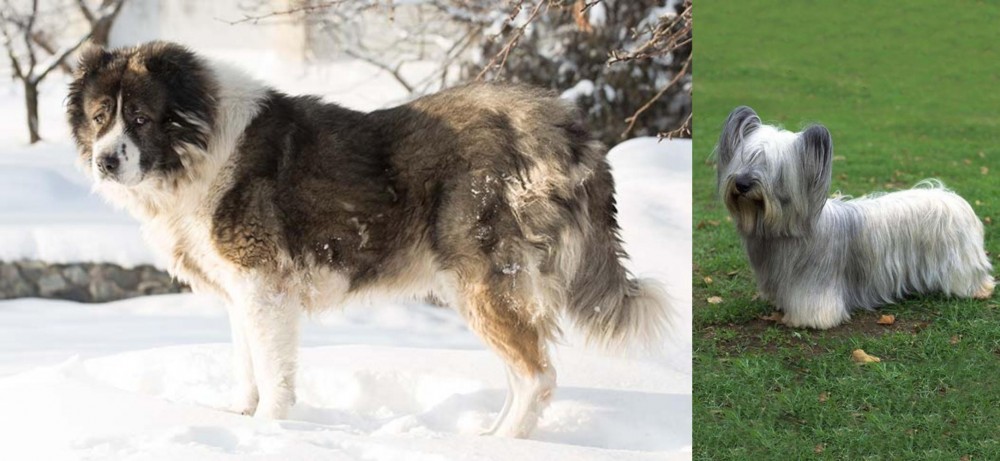 Caucasian Shepherd is originated from Russia but Skye Terrier is originated from United Kingdom. Caucasian Shepherd may grow 49 cm / 20 inches higher than Skye Terrier. Caucasian Shepherd may weigh 82 kg / 181 pounds more than Skye Terrier. Caucasian Shepherd may live 3 years less than Skye Terrier. Caucasian Shepherd may have more litter size than Skye Terrier. Both Caucasian Shepherd and Skye Terrier requires Moderate Maintenance.
Caucasian Shepherd is originated from Russia but Skye Terrier is originated from United Kingdom. Caucasian Shepherd may grow 49 cm / 20 inches higher than Skye Terrier. Caucasian Shepherd may weigh 82 kg / 181 pounds more than Skye Terrier. Caucasian Shepherd may live 3 years less than Skye Terrier. Caucasian Shepherd may have more litter size than Skye Terrier. Both Caucasian Shepherd and Skye Terrier requires Moderate Maintenance.
 This working dog is more than 2 000 years old, hailing from the Caucasus Mountains near the Georgian Republic, Russia.
This working dog is more than 2 000 years old, hailing from the Caucasus Mountains near the Georgian Republic, Russia.
The Caucasian Shepherd Dog is an ancient breed, always having been used to guard livestock in the mountains. Some believe they came from domesticated wolves, while others believe their ancestry includes Mastiffs and other breeds.
It was in the 1960s that the dog was used in Germany for patrol along the Berlin Wall. This dog is also known as the Caucasian Ovcharka and he is large and powerful, always being ready to take on anyone who threatens him or the livestock he is guarding.
His origins can be traced far back and eventually the dog found its ways to the USA where dog clubs were formed.The Caucasian Shepherd Dog is one of the oldest Molosser breeds, and today they are mostly appreciated for being wonderful family companions and watchdogs.
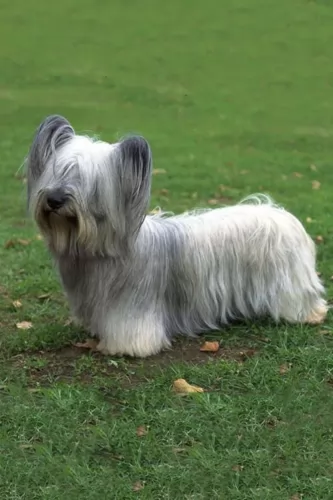 The Skye Terrier is a hardy dog breed and is actually considered to be an endangered native dog breed in the United Kingdom.
The Skye Terrier is a hardy dog breed and is actually considered to be an endangered native dog breed in the United Kingdom.
They were found on the Isle of Skye, although there is some confusion about its history. They were used long ago to hunt but these days they are essentially companion dogs.
They found their way to America and the Skye Terrier Club of America was founded in 1938. The American Kennel Club recognized the breed in 1887.
 The Caucasian Shepherd is a large, impressive looking dog standing at between 64 – 75cm in height and weighing between 45 – 70 kg. He has an almost bear-like appearance. His coat can be shortish or even fairly long, and in different colors such as white, tan, brindle, grey and cream with a black mask.
The Caucasian Shepherd is a large, impressive looking dog standing at between 64 – 75cm in height and weighing between 45 – 70 kg. He has an almost bear-like appearance. His coat can be shortish or even fairly long, and in different colors such as white, tan, brindle, grey and cream with a black mask.
The puppies are born black and then lighten as they grow up. He has a large head with the muzzle being smaller than the skull, narrowing slightly. The nose is black and the ears are set high and are floppy with dark eyes. The tail is set high and is long.
The Caucasian Shepherd is an intelligent breed but he must be properly trained and socialized as he can be stubborn and want to go his own way.
He is a balanced dog and he won’t deliberately hurt whom he regards as family, but he shows distrust towards strangers. While socialization and training relax and calm a dog, the Caucasian Shepherd isn’t regarded as the best dog to have with children around. This is because he comes from a lineage of guard dogs, bred to fight and guard.
He is a dog breed that will require a firm, strong owner and if you don’t have a lot of time on your hands, the Caucasian can be difficult to manage and perhaps isn’t the best choice for a first-time dog owner.
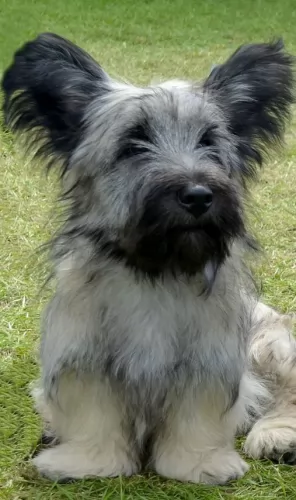 The Skye Terrier is a medium-sized dog standing at between 23 and 26cm in height and weighing between 12 and 18kg. The legs are short and sturdy. He is double coated with the top coat being straight and hard and forming a beard around the face area. The coat can be fawn, and in various shades of grey which are sometimes even black. The ears of the dog are medium sized and erect.
The Skye Terrier is a medium-sized dog standing at between 23 and 26cm in height and weighing between 12 and 18kg. The legs are short and sturdy. He is double coated with the top coat being straight and hard and forming a beard around the face area. The coat can be fawn, and in various shades of grey which are sometimes even black. The ears of the dog are medium sized and erect.
The Skye Terrier has always been a hunting dog and he enjoys quite a bit of exercise – walks, ball games as well as indoor games. Small though he may be, he is strong willed with a mind of his own and will benefit from being trained and socialized.
This is also necessary as he has a fairly reserved nature. He gets on well with children and makes an excellent family pet but he is ready to take on smaller pets in the home. He will bark when confronting strangers and makes an excellent watchdog too.
He is able to adapt well into life in the city or the countryside. He isn’t a dog to be left outside day after day and will just die of boredom, frustration and loneliness.
 Loyal, strong, and brave, the Caucasian Shepherd Dog does an excellent job protecting his human family. He is a territorial dog and in the past he has always been ready to take on wolves and bear to protect his sheep. He isn't the best choice for first time dog-owners and where there are small children in the home.
Loyal, strong, and brave, the Caucasian Shepherd Dog does an excellent job protecting his human family. He is a territorial dog and in the past he has always been ready to take on wolves and bear to protect his sheep. He isn't the best choice for first time dog-owners and where there are small children in the home.
He will do well to be trained and socialized as he becomes an obedient, patient, gentle, loving pet that becomes an excellent companion and protector.
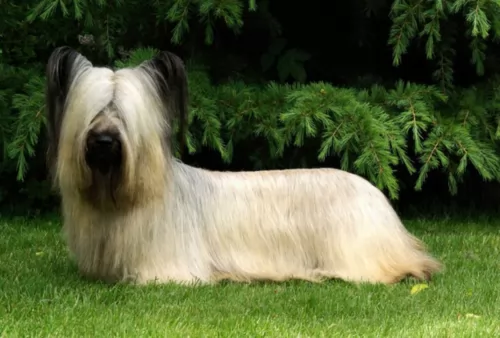 Give the Skye Terrier the attention he wants and he will reward you with his loving companionship.
Give the Skye Terrier the attention he wants and he will reward you with his loving companionship.
He loves the entire family but is best suited to homes where children have been taught to be kind to animals and to treat them with respect.
He has moderate energy levels and will expect you to give him a fair amount of exercise. The Skye Terrier can make an excellent companion for you and your family.
 Like all breeds there may be some health issues, even though the Caucasian Shepherd is generally a healthy dog. There are some common illnesses that every dog can get and which every responsible dog owner should be aware of -
Like all breeds there may be some health issues, even though the Caucasian Shepherd is generally a healthy dog. There are some common illnesses that every dog can get and which every responsible dog owner should be aware of -
One or two episodes of diarrhea isn’t an emergency, but ongoing diarrhea can lead to dehydration. If your dog is vomiting, he is lethargic and constantly emptying his bowels, see your vet if the diarrhea persists.
Parasites such as fleas and ticks and even internal parasites such as intestinal worms can drain the life from your pet. It is wise to find out about different parasites so that you can protect your dog. Find out what your vet’s treatment options are for parasites.
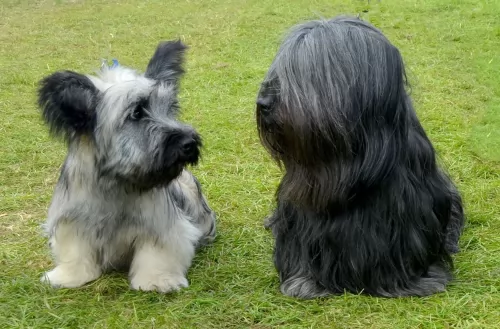 The Skye Terrier is a healthy dog breed. Perhaps the only issue that could be a problem with him is orthopedic problems. He is an achondroplastic dog, meaning a large body on small legs.
The Skye Terrier is a healthy dog breed. Perhaps the only issue that could be a problem with him is orthopedic problems. He is an achondroplastic dog, meaning a large body on small legs.
He could develop spinal problems if he were allowed to constantly be jumping off beds and high chairs.
Orthopedic problems affect the bones, muscles and joints and can actually be debilitating. Orthopedic conditions can be ligament tears or hip dysplasia for instance, accompanied by arthritis.
You’ll notice your dog has an abnormal way of walking or running, inability to get up once lying down and he may have arthritis and pain.Be careful because obesity can trigger problems with the joints and bones.
 The Caucasian Shepherd Dog has a thick double coat that will certainly require brushing twice a week. The coat comes in different lengths – short, medium and long. The hair is mostly long and the long tail is also feathery. The best way to groom your large, furry pet is to invest in some good grooming tools such as a good brush to keep your pet’s hair in tip-top condition.
The Caucasian Shepherd Dog has a thick double coat that will certainly require brushing twice a week. The coat comes in different lengths – short, medium and long. The hair is mostly long and the long tail is also feathery. The best way to groom your large, furry pet is to invest in some good grooming tools such as a good brush to keep your pet’s hair in tip-top condition.
His nails will need to be trimmed regularly, his ears will also need to be checked to avoid wax build-up and the accumulation of grime. This can lead to an ear infection. His teeth should be brushed 2 or 3 times a week with special dog toothbrush and toothpaste.
The Caucasian Shepherd isn’t going to do well in a small home with tiny garden in the city. He is a big dog that will require a large yard even though he is a fairly low-energy dog. He will be suited to a family that is active, that will take him on daily walks, hikes and include some ball games.
You will need to change your Caucasian Shepherd Dog’s food as he goes through the different phases of his life, from puppy to adulthood. Speak to your veterinarian about a commercially produced dog food is you’re unable to give him home-made food. These foods are available in breed-specific and age-specific formulas.
Reputable breeders will also help you ensure that you know how to start feeding your puppy. Caucasian Shepherds are a large breed and apart from their kibble, you’ll want to include rice, vegetables and cooked chicken from time to time in his kibble and also include raw meat occasionally.
If you're unsure, ask your veterinarian or breeder about the best diet to ensure his longevity. Clean, fresh water should be available at all times.
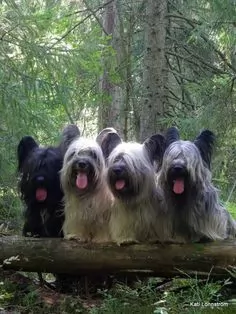 ● The coat of the Skye Terrier is long and silky and will most certainly require brushing every day if you keep the hair long. Such silky hair can easily become matted.
● The coat of the Skye Terrier is long and silky and will most certainly require brushing every day if you keep the hair long. Such silky hair can easily become matted.
● Little dogs like this will need their teeth being checked regularly. You can even try to buy special pet toothpaste and toothbrush and brush his teeth yourself. If you prefer, a professional dog groomer can do this for you and at the same time trim his nails and check his ears and clean the insides of the ears too to avoid infection.
● Provide him with top quality food as the quality of the dog food you buy makes a huge difference to his health and longevity. He is a small dog and there are some excellent commercially manufactured dog foods specially made for small, energetic dogs.
Try to include some home-made food for him which can be simply mixed into the dry kibble twice a week. Boiled chicken, brown rice or pasta and spinach, sweet potatoes and carrots is super tasty and nutritious. Ensure there is always a bowl of fresh, cool water within his reach.
● Keep his vaccines up to date against some deadly canine diseases, and get him to the vet when he shows signs of illness.